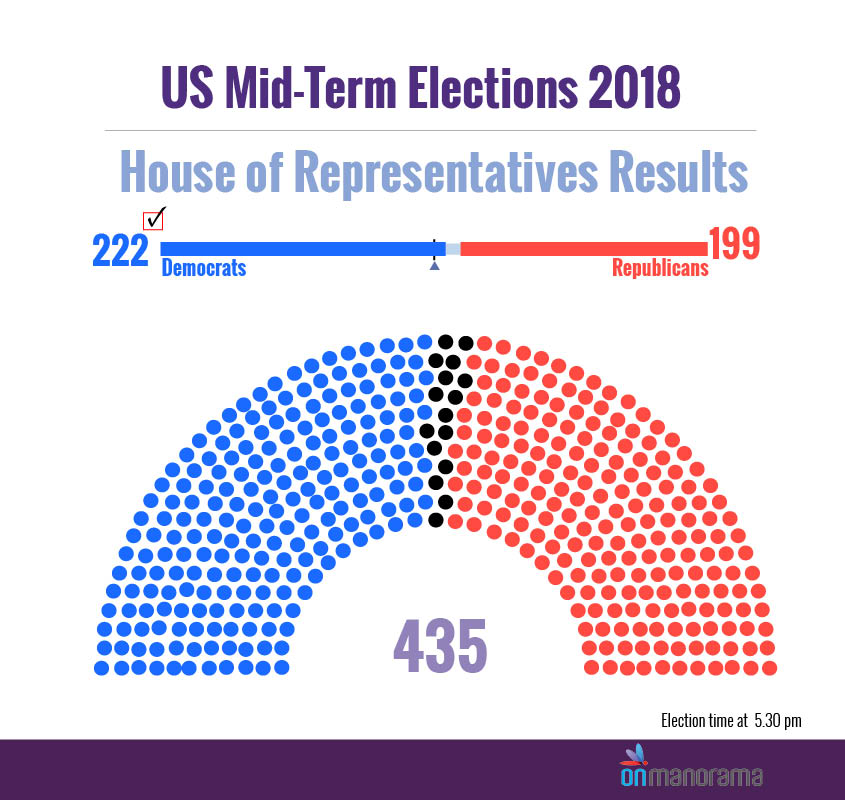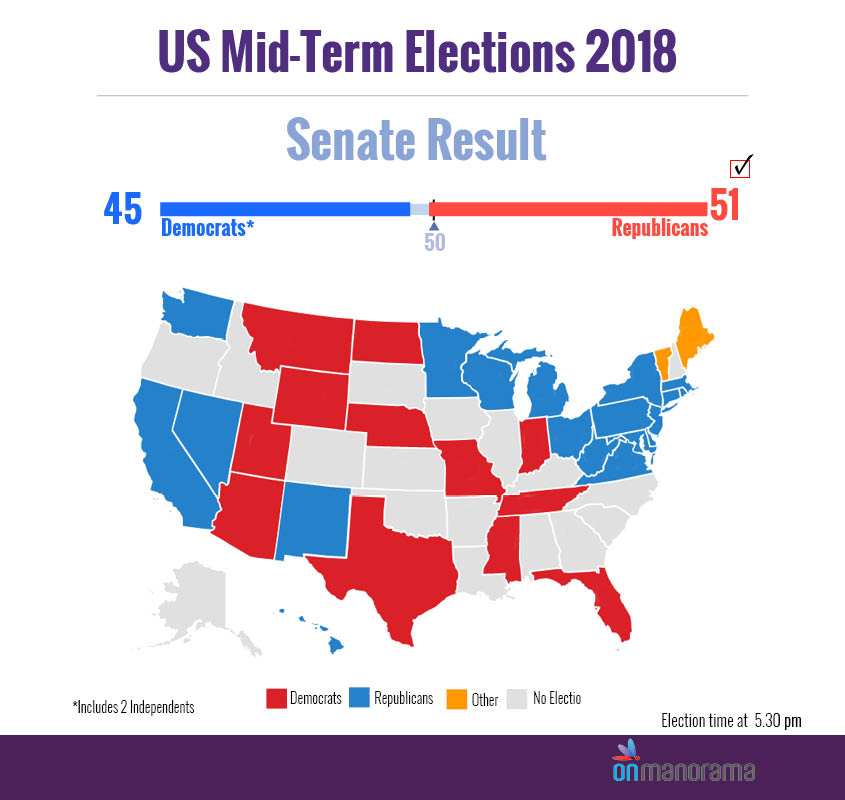Washington: Let the 2020 White House race begin.
Tuesday's elections sounded the starting gun for a long, crowded, expensive and no doubt dramatic race for the presidency.
Democrats, riding a wave of momentum from their gains in the US House of Representatives, enter the presidential cycle without a clear front-runner for the first time since the start of the 2004 campaign.
More than two dozen possible contenders, including former Vice President Joe Biden and a gaggle of senators, governors, mayors and business leaders, have been jockeying for months to line up donors and evaluate their shot at the party's nomination.
Awaiting the winner will almost certainly be President Donald Trump, a Republican whose approval ratings have been mostly stuck below 50 percent since he took office but whose popularity within his party will make any potential challenge from another Republican the longest of longshots.

Trump loomed over Tuesday's midterm elections, fuelling turnout among Democrats eager to reject him and driving many Republican candidates to pledge support for him or else face a backlash from their conservative base.
Democrats are already wrestling with questions about which candidate, strategy and approach are most likely to beat Trump on Nov. 3, 2020. Many Democrats are expected to jump in the race early, within the next few months.

Whoever emerges from the gruelling state-by-state Democratic nominating process, which kicks off in Iowa in early 2020, will have to stand up to the pugilistic Trump while developing an appealing alternative agenda and uniting the party's sometimes feuding progressive and establishment wings, Democrats said.
"There will be a lot for Democrats to work through this time," said Jennifer Palmieri, communications director for Hillary Clinton's 2016 run. "It's not just finding the person who can beat Trump, but also the person who has a vision for unifying the country."
Encouraging signs
Democrats said the midterm campaign offered plenty of encouraging signs for the 2020 race, as grassroots enthusiasm to resist Trump led to a new majority in the House of Representatives, a flood of first-time candidates up and down state ballots and an explosion of left-leaning advocacy groups and grassroots protests.

Even the losing campaigns of unabashed liberals Andrew Gillum, who lost his bid to be the first African-American governor of the swing state of Florida, and Beto O'Rourke, who became a grassroots sensation but fell short in his U.S. Senate bid in conservative Texas, offered lessons on how to run strong races on Trump-friendly turf, Democrats said.
"The model for 2020 is Andrew Gillum and Beto O'Rourke. The nominee is going to have to produce large-scale grassroots support and go everywhere and reach out to everybody," said Neera Tanden, president of the liberal Center for American Progress.

The midterm campaign showed the power of Trump and the #MeToo movement to motivate women, sparking an unprecedented number of female candidates and encouragement for women considering a 2020 run such as Senators Kamala Harris, Elizabeth Warren, Kirsten Gillibrand and Amy Klobuchar.
"We have a whole universe of suburban women and voters under 40 who are so ticked off at Trump they are coming out to vote in droves and energizing the base organically," said John Anzalone, a Democratic pollster for both Clinton and former President Barack Obama.

The Democratic contenders will have to navigate the struggle between the party's establishment and progressive wings that flared during the 2016 primary between Clinton and Bernie Sanders, with several candidates expected to test how far to the left they can run and still win a national election.
'That's the trick'

"That's going to be the trick in 2020 - can you be the person who puts that coalition together and holds it?" said US Representative Tim Ryan of Ohio, one of the dozens of Democrats pondering a possible White House run.
"We need to think about how we reassemble a new progressive coalition that pulls in independents and moderate Republicans and independent women and working class people, and makes it a coalition we can sustain for a decade," Ryan said.
Sanders, who is considering another presidential bid, pushed the party and Clinton to the left in 2016 on signature issues such as universal healthcare, a $15 minimum wage and free tuition at public colleges.
The most successful Democrats during the midterms were able to talk about checking Trump while also offering an alternative liberal vision, Democrats said.
"Figuring out who can thread that needle is going to be a key part of the Democratic primary process," said Charles Chamberlain, executive director of the progressive Democracy for America political action group.

The crowded Democratic field, which could be bigger than the 17 Republicans who ran in 2016, could have plenty of familiar faces such as Biden, Warren and Sanders - ages 75, 69, and 77 respectively.
Biden was the early leader for the Democrats in a Reuters/Ipsos Election Day opinion poll at 29 percent. He was ahead of Sanders, who registered 22 percent. Both beat Trump in a hypothetical head-to-head matchup.
The field also should have plenty of less known contenders such as Governor Steve Bullock of Montana, former governors Deval Patrick of Massachusetts and Terry McAuliffe of Virginia, and Mayor Eric Garcetti of Los Angeles and New Orleans' former mayor, Mitch Landrieu.
The race starts early
With such a sprawling field, many candidates are expected to jump in early. Only one Democrat, little known US Representative John Delaney of Maryland, has formally announced a bid so far.
Trump, who filed for re-election the day he was inaugurated, is primed for the fight. He has taken to belittling potential Democratic rivals during his frequent political rallies to support Republican candidates, and has been building his supporter lists for nearly two years.
He already has a campaign slogan, "Keep America Great" - following "Make America Great Again" in 2016 - and has raised $106 million for re-election, financial reports show.
He is unlikely to face a serious Republican primary challenge, and any longshot bid would be a largely symbolic one from the party's narrow anti-Trump wing, led by Ohio Governor John Kasich, who lost to Trump in 2016, and Arizona Senator Jeff Flake. Both are frequent Trump critics who are leaving office.
"I would seriously doubt" there will be a challenge to Trump, Senate Republican leader Mitch McConnell said, adding Republicans feel good about their political standing.
"From a right of center point of view, it doesn't get any better than this Congress. And I think the president has many things to feel good about," McConnell said.
Democrats have no illusions about the race. Trump has repeatedly shown his ability to dominate opponents and turn controversies into rallying cries for his base.
The 2020 campaign will be Trump's first time on a ballot since his shocking 2016 upset of Clinton, when he used his fame as a businessman and former reality TV star with no experience in elected office to cast himself as the change candidate who would smash the status quo.
This time, Democrats say they must be the agents of change.
"If we are in a race where voters are deciding between Trump and someone who is defending the Obama years, we'll be in trouble," Tanden said.


















